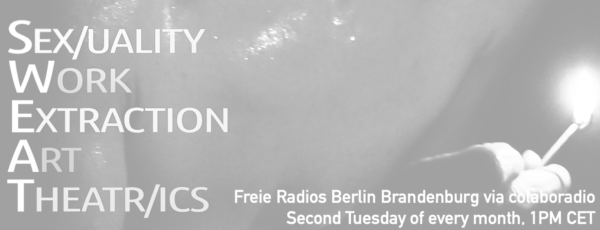S.W.E.A.T. features conversations about performance and performativity of the sexual/ized and racialized body at work – work as performed labour of survival, care and a/Art; episodes air on Freie Radios Berlin Brandenburg via colaboradio, the second Tuesday of every month at 1PM CET.
More info HERE, listen to interview archives on Soundcloud and usual podcast platforms.
The creator of this series and host, electronic producer, sound designer, performance artist, and writer Kathryn Fischer aka Mad Kate, explains:
“We all sweat as we provide care, as we labour, as we perform our work, as we survive and as we sacrifice one choice for the other. How exactly do we define our work and how does that work entangle and circumscribe our sexual identities, our racialized bodies, our creative lives, and the ways in which we provide care? These conversations are a means to speak between intersectionalities by anchoring through our (always, already, and ever pervasive) sexualized and racialized bodies, our working bodies, our artistic bodies and our performative bodies. I hope that they contribute to dialogues which normalize sex work as work, and all work as deserving of respect, healthy conditions, and a living wage.”
“The idea for S.W.E.A.T. was born experientially. Since 2004, I have been a working performer in the so-called free scene at the intersection between club life (circus, cabaret, neo-burlesque), the music industry, film, television, music video, theatre, gallery “performance art,” the service industry, and sex work. What I know from working in these scenes is that they often bleed into each other, and that the body—my body—is read differently depending on which stage I find myself. The show might be the same, but the way the show is read and also valued is completely different. This reading and valuing affects how I understand my artistic practice and, in a sense, my identity. What I also understand is that race and gender, sex and class crisscross these scenes with secret codes signs and signifiers. But at the end, the labouring body of an individual performer, musician, sex worker, or service worker, is the most devalued aspect of the entire industry, and this generally makes for an unsustainable relationship to work as the body changes, ages, and transitions. I learned that some of the most meaningful work in my life was the least paid, and that the performance of different kinds of work was not only a performance of identity but a somatic experience that impacted my body.”
“I love the interview format because I think one of the ways to change the world is by having one on one conversations with other people and through the practice of deep listening. That means sometimes listening to what someone is saying to me five, six, ten times in the editing process. Then I can begin to really understand other perspectives. I use this platform to understand how other people, in other bodies—different from and sometimes similar to my own— relate to their own labour, paid and unpaid.”

